How to clean an oven quickly – get it done in 30 minutes or less with these time-savvy expert tips
Because no one wants to spend hours on this unappealing chore
Katie Sims
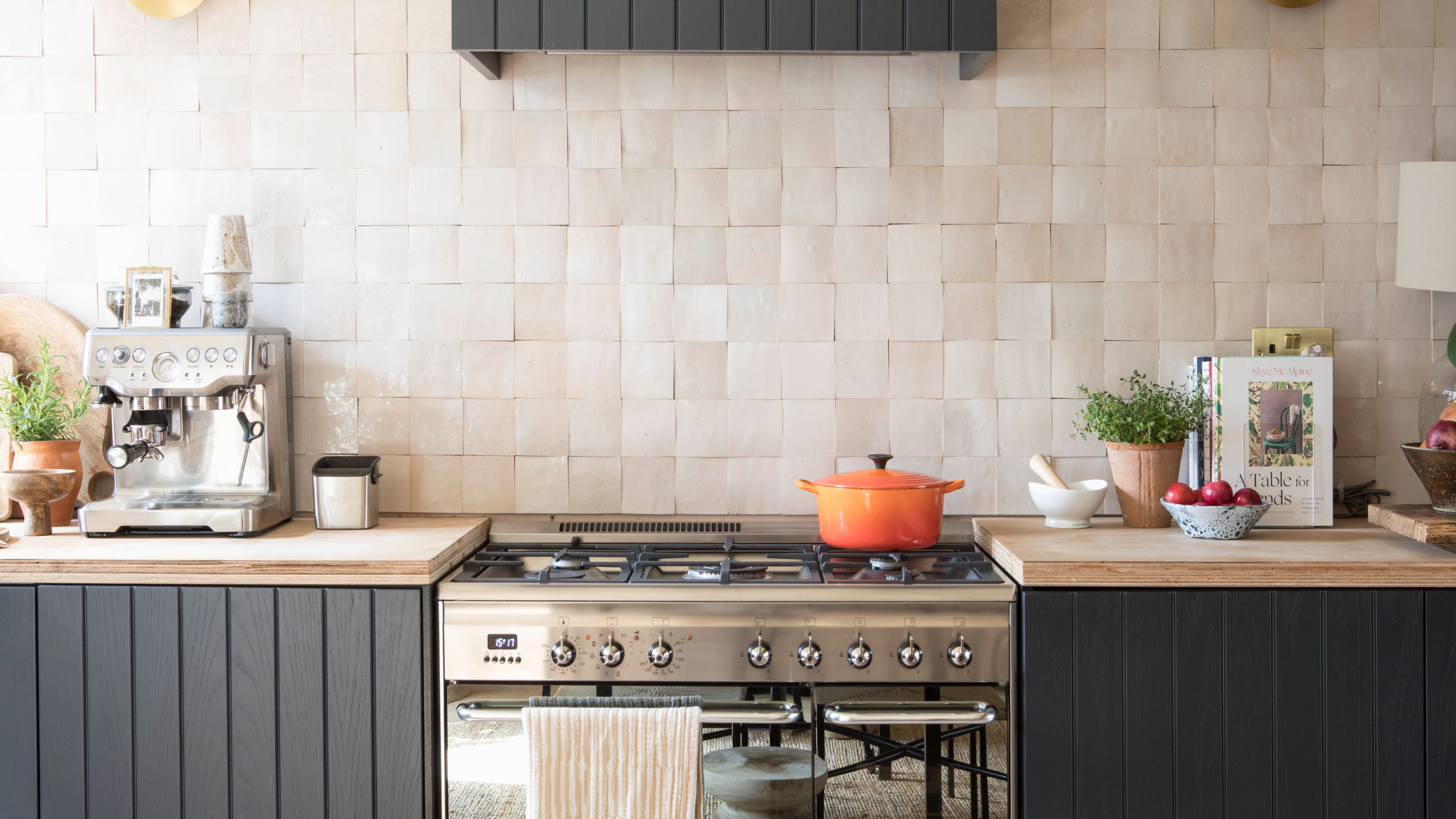
Sign up to our newsletter for style inspiration, real homes, project and garden advice and shopping know-how
You are now subscribed
Your newsletter sign-up was successful
Christmas prep is in full swing, and the list of things to clean ahead of the big day can sometimes feel never-ending. Cleaning the oven is unfortunately a chore we can't skip, but the fact that you can learn how to clean an oven quickly is definitely music to our ears.
Cleaning an oven is up there with the jobs we want to put off for as long as possible. And yet, given that we're using it to cook food on most days, it's really important that we are taking the time to clean it - especially ahead of Christmas, where it will be seeing even more use than usual.
After speaking to cleaning experts, we now know that this job doesn't need to swallow hours in a day. In fact, once you know how to clean an oven quickly, all you need is 30 minutes to get the job done.
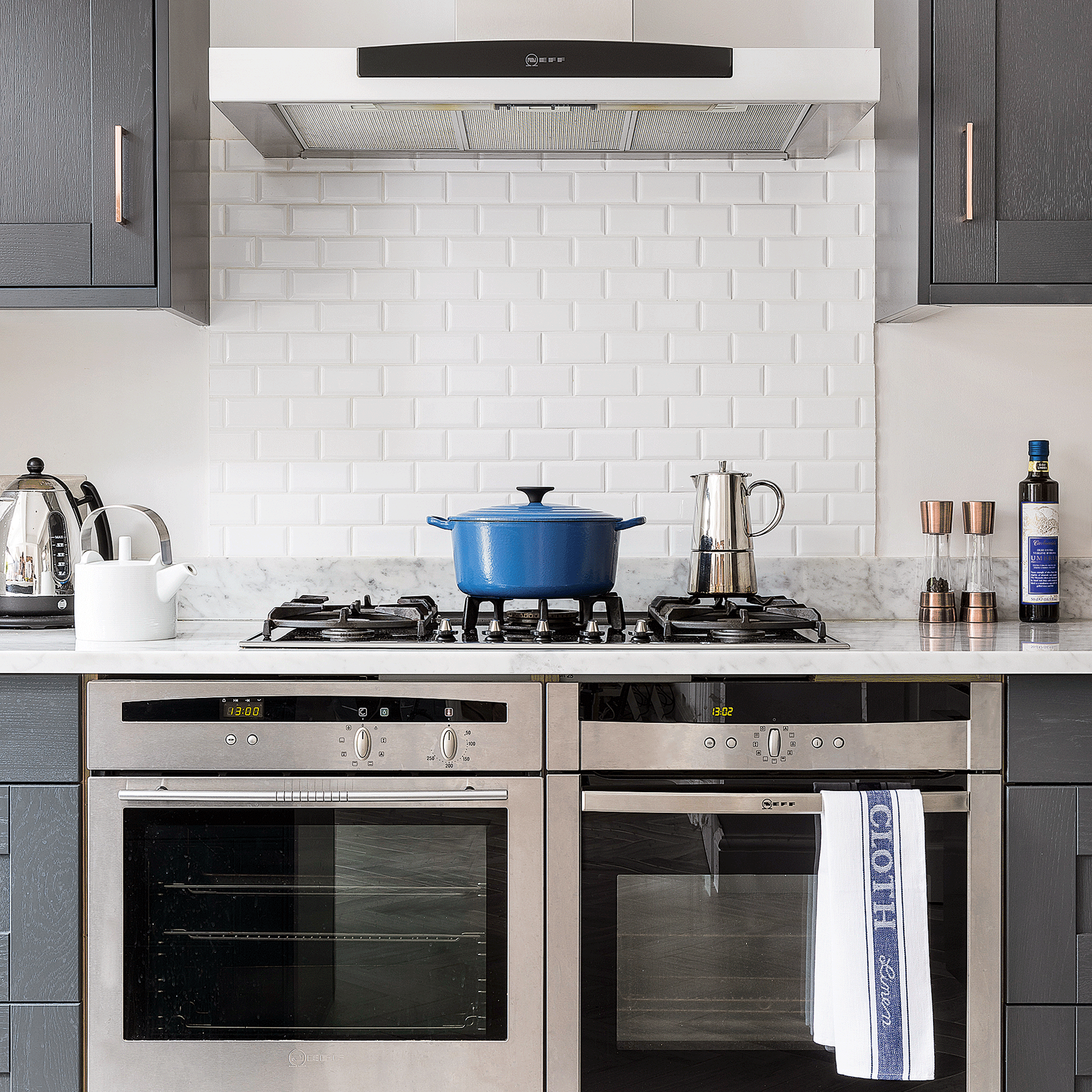
How to clean an oven quickly
If your oven is fairly new, it could have a self-cleaning option, which of course makes this chore even quicker. Lauren Clark, a large appliance expert at AO.com explains, ‘Newer models of ovens now feature pyrolytic self-cleaning functions, which take out all the hard work and keep your oven squeaky clean in a quick, high heat cycle.’
However, even self-cleaning ovens need some manual work – you will still need to know how to clean oven racks and how to clean an oven door. If you have an oven that doesn’t have a self-cleaning setting, there is still a way to tackle it in a hurry.
How to clean an oven quickly - What you'll need
- A vacuum, such as this handheld vacuum for £35.99
- Lemons - pick yours up from the supermarket, or simply add these ones to your Amazon basket
- Distilled Vinegar - you can get 2x 5L bottles of white vinegar for just £7.99 from Amazon
- Bicarbonate of Soda - you can get a 500g bag for £3.99
- Dishwasher Tablets - this pack of 70 Fairy dishwasher tablets is £9.99 from Amazon
- Scouring sponge - soap filled scourer pads like these ones are perfect for oven cleaning
- Dishcloths, such as these extra large cotton dish cloths for £5.49
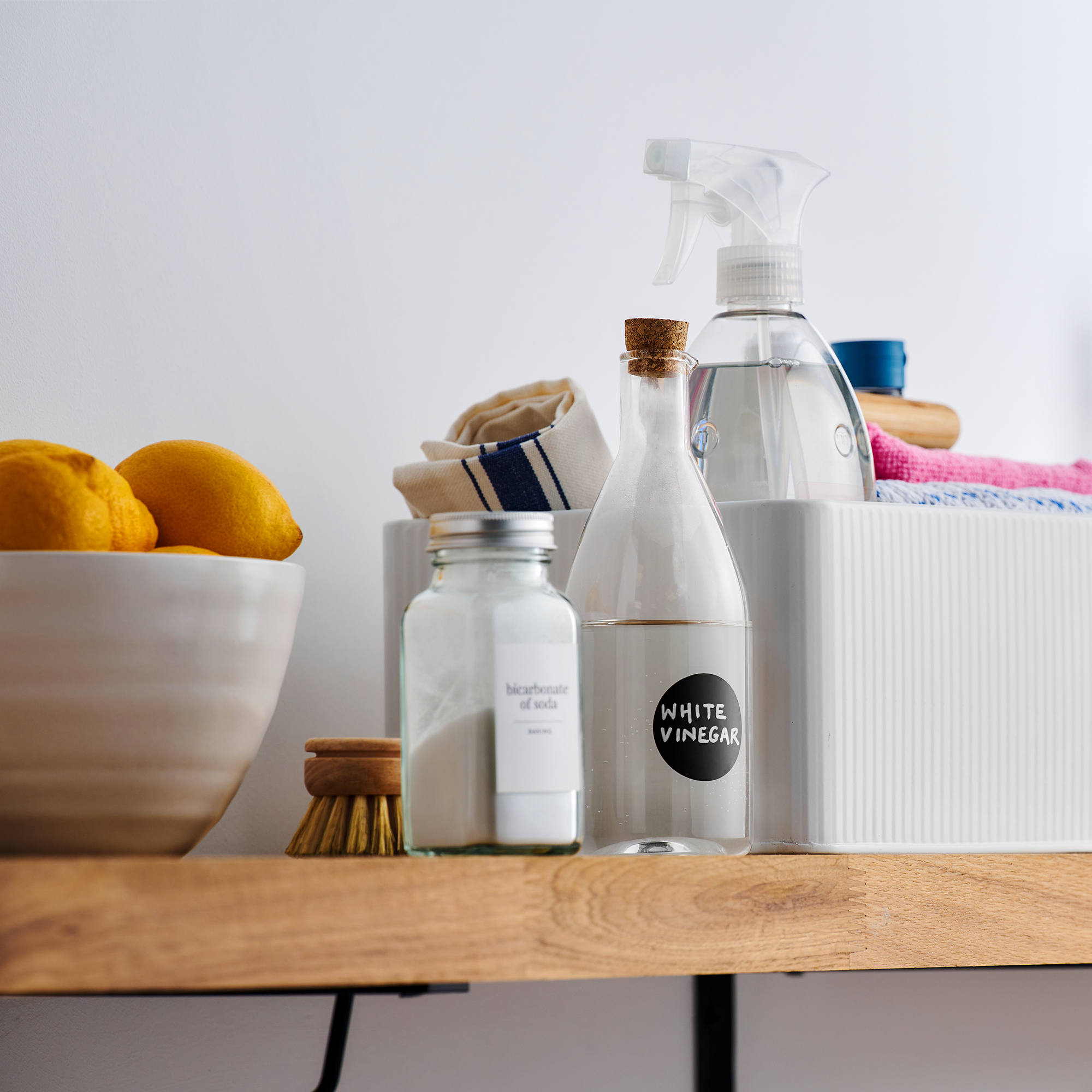
How to clean an oven quickly - Step-by-step
1. Before you begin
Before cleaning, you need to rid the oven of loose debris first. Matt Ayres, a consultant at RDO, one of the UK’s largest independent appliance retailers, says, ‘Before you begin scrubbing your oven, use a vacuum to clear up any debris, crumbs or burnt bits from the bottom of the oven.’
One of the best cordless vacuums will make this part easier, and you'll need to use the crevice attachment to get inside the oven. Or, use a handheld vacuum if you have one.
Sign up to our newsletter for style inspiration, real homes, project and garden advice and shopping know-how
2. Use steam to loosen grime
Lauren from AO.com says, ‘If you have a lot of build-up, a great pre-cleaning solution is to steam the oven out. You can do this quite simply with an oven safe bowl of water and a squeeze of lemon – heat the oven up and allow the water to steam for 5 minutes, before turning off and allowing to cool.’
Cleaning an oven with lemon is surprisingly effective, because the acidic fumes help to dislodge stubborn bits of grease and grime. It makes the actual cleaning steps a lot easier.
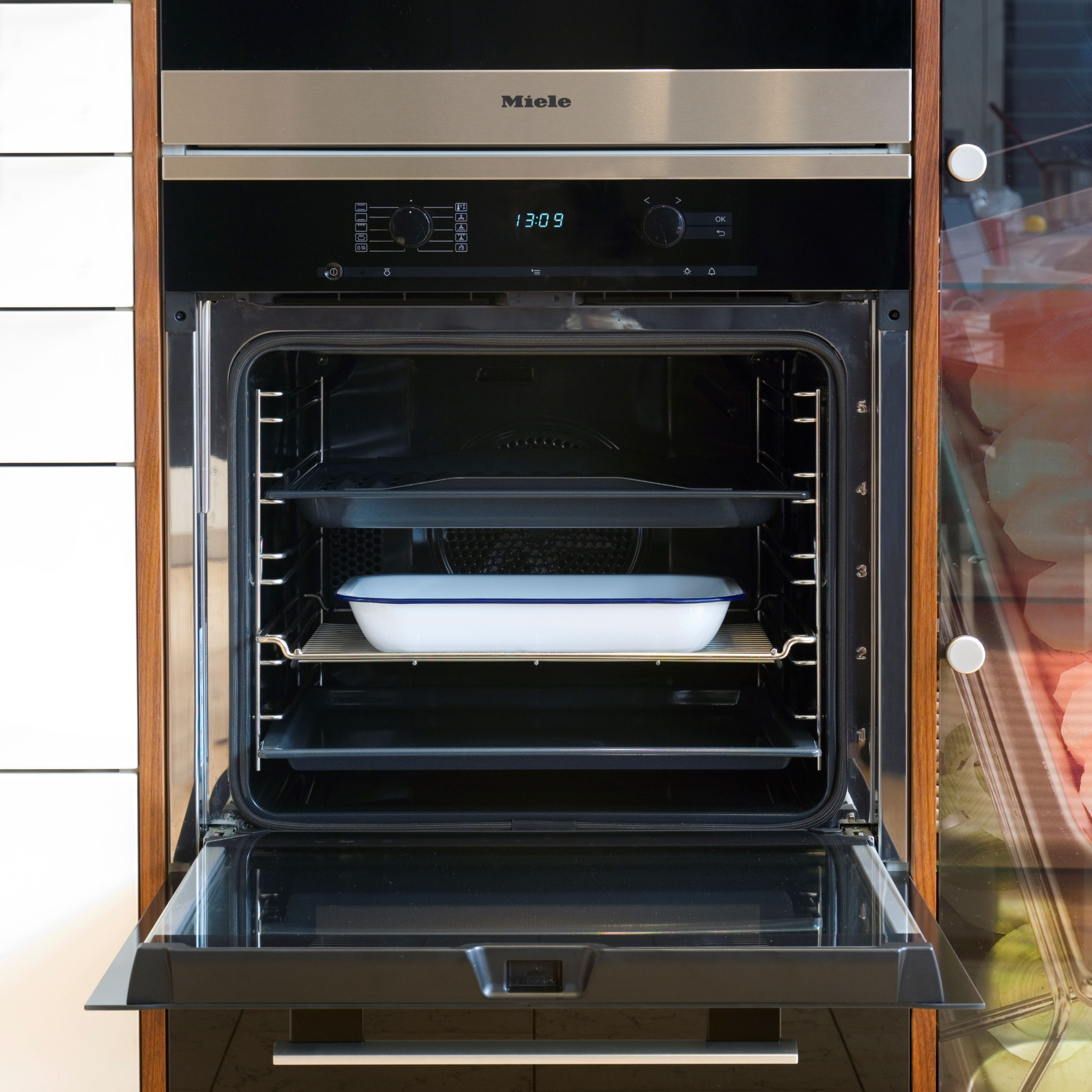
3. Remove racks
Before you clean the cavity, remove the racks and add them to a dishwasher if they’ll fit. If not, soak them quickly in a large washing bowl filled with warm water and dish soap. Leave them to soak whilst you move onto the next step.
4. Clean inside
At this point, enough dirt should have been loosened by the steam that removal will be a breeze. What you use to clean the oven is dependent on how you feel about using strong chemicals. If you want to avoid them, it doesn’t mean you’ll have to double the time spent cleaning.
'If I can I will always go to the store cupboard for natural ways of cleaning an oven,' says Roisin Smith, a professional cleaner at Wecasa. 'Make a simple paste of equal parts baking soda and water and rub it all over the interior of the oven.' Leave the paste to do its thing for 20 minutes.
If you do want to opt for a stronger chemical cleaner, make sure your home is well-ventilated and children and pets are kept far away.
Sophie Lane, a product training manager at premium appliance brand Miele advises, ‘If you need to use a more aggressive oven cleaner be very careful not to spray this into the fan or air-vents as you will be unable to remove any residue and this can release a strong odour when the oven is next used.’
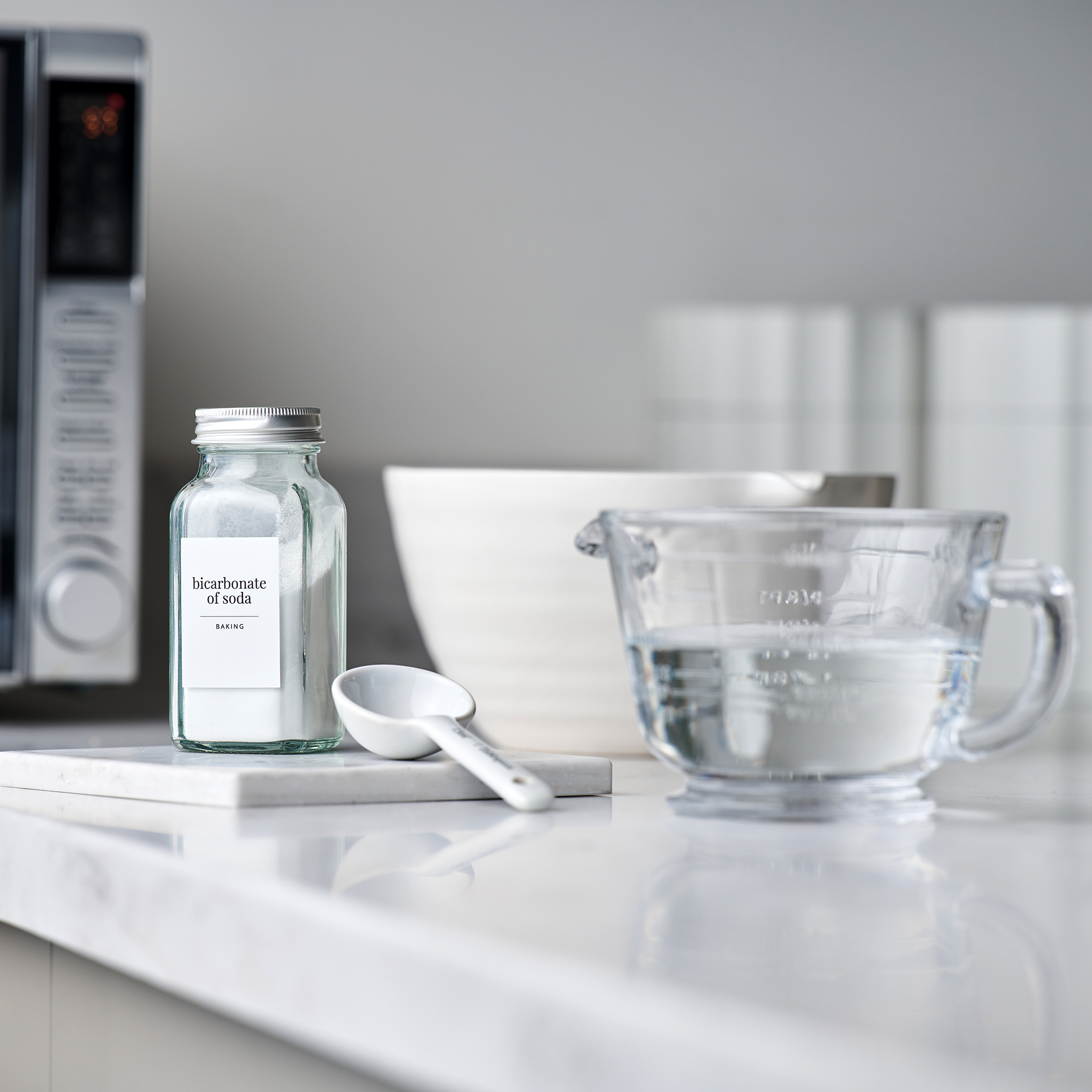
5. Tackle the door
To utilise your time as efficiently as possible, whilst the paste is busy tackling the dirt in the cavity of your oven, you should get to work on the door. James Longley, managing director at Utility Bidder says, ‘When cleaning your oven glass door, you should be opening it all the way, and making sure that all loose debris is wiped away with a damp dishcloth or paper towel.’
The door can be cleaned with the same paste as the cavity, or James suggests, ‘wetting a dishwasher tablet and rubbing against the oven door with a wet cloth.’
Cleaning with vinegar is also a good option for this. Leave whichever cleaner you use to soak in whilst you get back to the cavity.
6. Remove paste and the grime with it
After 20 minutes, the bicarbonate soda paste should have done its job. Professional cleaner Roisin recommends spraying vinegar over the paste next, 'to trigger a fizzing reaction that helps lift grime and then wipe clean with a damp cloth.'
Do the same to the paste on the door, using circular motions with a sponge and then rinse both the cavity and the door thoroughly. Quickly rinse off your racks and dry them, the door and the cavity with a dishcloth.
And that's it - you've learnt how to clean an oven quickly, and it should be squeaky clean.

FAQ’s
Why should we clean the oven?
Learning how to clean an oven quickly is important, as it means we'll be less likely to skip this job. Jessica Rhodes from appliance brand ASKO explains, ‘A clean oven is more energy efficient because the heat will distribute more efficiently with less energy, leading to even baking.’
She adds, ‘If an oven is filled with food debris and grease, it can obstruct the heat distribution and thus increase the time taken to cook food. This then puts pressure on fans and thermostats to work harder, resulting in higher energy bills.’
Jessica goes on to explain that a dirty oven could also pose a health risk. ‘If consumers let food grease and spills accumulate over time in the oven, it can become a breeding ground for bacteria and mould. This can lead to potentially dangerous health issues.’
What does putting a dishwasher tablet in your oven overnight do?
Cleaning your oven with a dishwasher tablet is a handy hack that started going viral this year. The typical method is to put a tablet in an oven-proof dish, fill it with water, and leave the it in the oven at 100°C for an hour. But, some people are now taking this one step further and leaving the tablet in the oven overnight.
'Placing a dishwasher tablet in a dirty oven overnight can work on softening grease stains, because the enzymes in the tablet break down fats and oils,' Roisin from Wecasa explains. 'In the morning, the residue can be wiped away with ease. This trick is especially useful for baked-on stains but may not remove the toughest grime without some scrubbing.'
However, it's generally not advised to leave your oven switched on all night. Aside from being a waste of energy, it can lead to overheating, which when combined with the chemicals from the dishwasher tablet, isn't a good combination. It's best to stick to the 1 hour dishwasher tablet hack instead.
How do you clean a heavily dirty oven?
When an oven is really dirty, cleaning solutions will need to be left on longer (sometimes three hours), racks will need to soak longer (often overnight), and there will be more time spent scrubbing (occasionally around an hour). Staying on top of this much-dreaded chore will therefore save you a lot of time in the long-run.
'I like to use a so-called “pre-treatment” for really dirty ovens, letting the baking soda and water paste sit for several hours or overnight,' Roisin says. 'Then, you can scrub it with a brush or sponge. For really stubborn areas, use a commercial degreaser like a specialised oven cleaner or a powerful natural solution like vinegar and lemon juice to dissolve grease.'
Do baking soda and vinegar really clean ovens?
Mixing baking soda and vinegar causes a reaction that produces carbon dioxide gas, which is great for cleaning - especially when it comes to grease and grime. Plus, because baking soda has a mild gritty texture, it means it can be used as a fairly gentle abrasive, which again is good for lifting caked-on grease.
Natural cleaning agents like vinegar, baking soda, and lemon are all ideal for cleaning an oven without chemicals, and in fact, some experts prefer to reach for these over dedicated oven cleaners. They can be just as effective, without the use of harsh additives, which ideally, you don't want lingering in your oven.
If your oven is really dirty, a quick 30-minute clean might not cut it, and you may need to look into how much it costs to professionally clean an oven. However, you can prevent it from getting to this point if you keep on top of your cleaning and know how often to clean an oven quickly, so the grime doesn't build up.
Do your future self a favour and keep on top of this chore.
- Katie SimsContributor